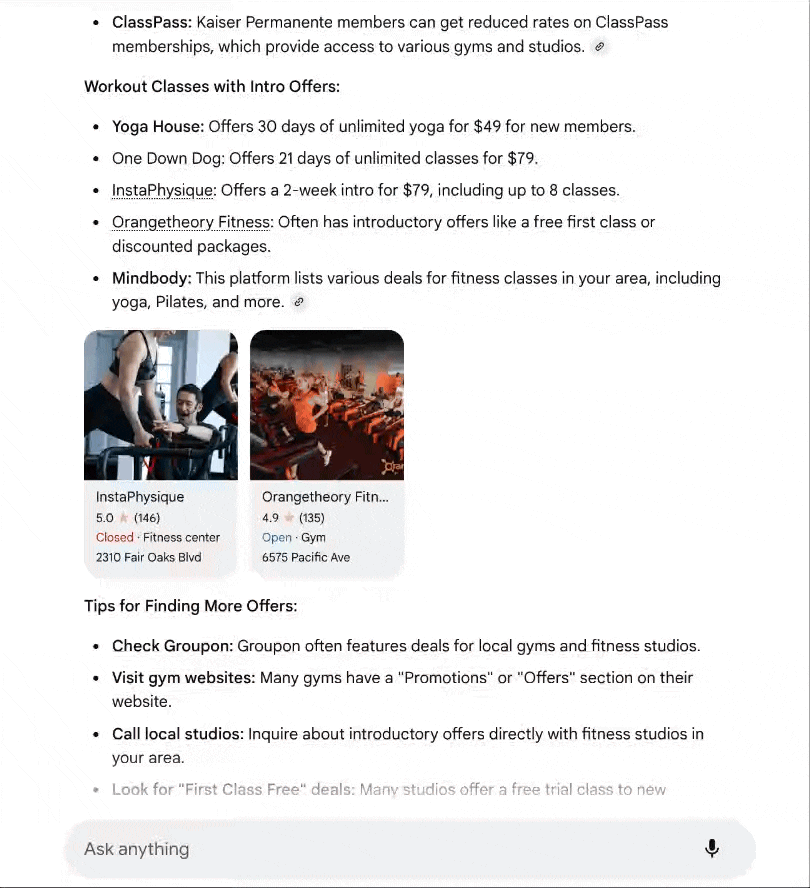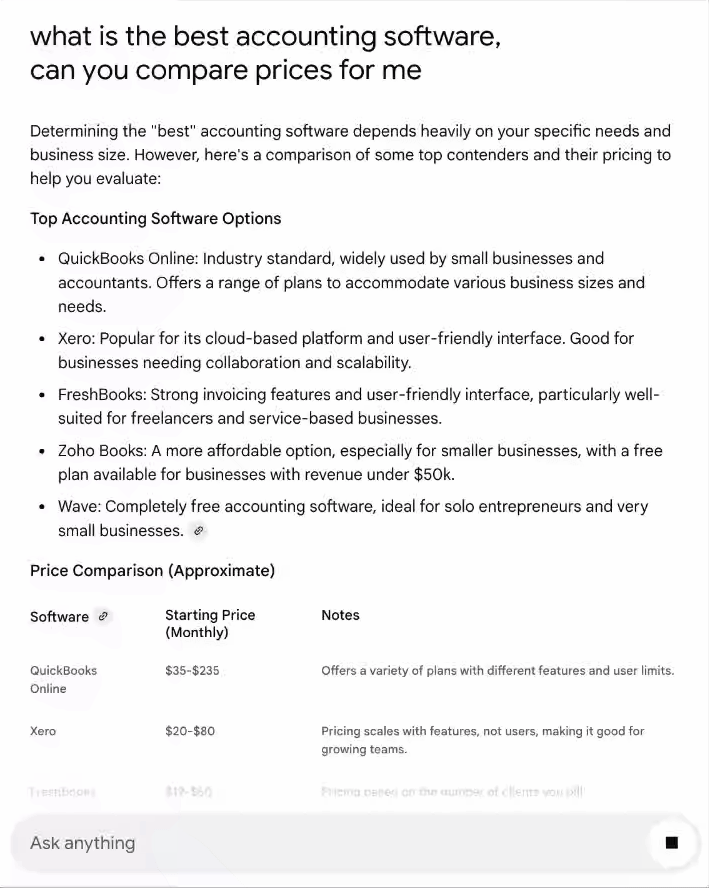If you hadn’t noticed, Google may have changed the way we search forever (deep breath’s everyone…). If it did slip past your feed last week, not to worry, we’re here to keep you in the loop as search continues to evolve.
Wondering what Google AI Mode is and how it impacts your website?
Let’s start with what Google AI Mode does, why it matters, and how to adjust your SEO strategy to make sure your website ranks across the board.
What you'll learn in this blog:
- What Google’s AI Overviews are and how they change search behaviour
- Why traditional SEO tactics alone may no longer be enough
- The types of content most likely to be pulled into AI-generated results
- How to position your site as a trustworthy source for AI engines
- Actionable steps to adapt your SEO strategy for the new AI search landscape
What Is Google AI Mode?
Google AI Mode changes how search results are delivered by generating direct answers using its Gemini 2.5 AI.
Instead of simply listing pages, it analyses queries, breaks them into parts, reviews multiple sources, and builds complete, cited responses.
Using its Gemini 2.5 AI, Google can now:
- Breaks down your question into clear parts
- Reviews multiple sources for information
- Builds a complete answer
- Lists its sources for credibility
This shift means SEO is no longer just about ranking first, it’s about being the most trustworthy source AI pulls from.
Combined with Project Mariner, which enables actions like bookings and purchases, Google’s AI-driven search is transforming web usage alongside AI Overviews.
Failing to adapt could significantly impact your site’s traffic and lead generation.
Why This Matters for SEO
Google’s AI Mode doesn’t just change how results appear, it changes how users interact with search. Instead of clicking multiple links, users expect full, accurate answers instantly.
This shifts your competition from “ranking” to “being cited.” Understanding and adapting to this behavioural shift is key to maintaining relevance.
How to Access AI Mode
- Visit: google.com/aimode
- Or: Click the “AI Mode” tab beneath the search bar on the Google homepage .blog.google
Requirements to Access AI Mode
- Google Account: Ensure you're signed in.
- Search History: Must be enabled.
- Browser/App: Use an updated version of Chrome or the Google app.
- Language: AI Mode is currently available in English.
AI Mode Usage Tips
- Input Methods: Enter queries via text, voice, or images.
- Follow-up Questions: Ask additional questions to refine results.
- Source Links: Access links to original sources for more information.
AI Mode offers users a conversational, AI-powered search experience, providing comprehensive answers and the ability to delve deeper into topics:
Content Ranks in Google’s AI Mode
AI Mode favours content that clearly and directly answers real questions, according to its own guidelines.
Ultimately, Creating AI-friendly (or human-friendly) content improves your visibility in generative AI search results by aligning with user intent.
Although AI search engines use complex algorithms, their core objective is to serve people.
That means content that is clear, relevant, and genuinely valuable is more likely to rank well. By focusing on readability, topical relevance, and usefulness, you meet both the technical and human standards that drive higher rankings.
To rank in Google’s AI Mode, structure your content around these principles:
Query Fan-Out: What It Is and How To Work With It
Google AI Mode doesn’t just process your query as one big question. It breaks it into smaller ones, finds answers from different sources, and then combines them into a single, AI-generated response.
This is called Query Fan-Out.
Example:
Search: “Best budget smartphone with great camera and long battery life.”
Google splits this into:
-
Best budget smartphones
-
Phones with top camera quality
-
Phones with strong battery life
It might take a spec comparison from a review site, a camera ranking from a tech blog, and a user comment from Reddit — then combine them all into one result.
Why this matters:
You no longer need to cover everything in one article. You just need to:
-
Clearly answer one part of a bigger question
-
Use straightforward subheadings like “Which budget phones have great cameras?”
-
Keep each section focused on one idea
-
Make it easy for AI to extract your content
The new goal isn’t to rank #1. It’s to be the best source for one specific part of a broader query.
Structure your content so AI can find and cite it.
Answer Real Questions by Solving Real Problems
Don’t just optimise for keywords, solve real user problems.
Instead of relying only on search terms, explore how people naturally express their concerns in places like Reddit, Quora, and support forums.
These are rich sources of problem-first queries like:
-
“I feel tired after running, should I take creatine?”
-
“I can’t focus at work, is it burnout or just stress?”
-
“Why does my back hurt after sitting all day?”
These questions are emotional, conversational, and often layered. To rank in AI Mode:
-
Address both emotions and intent (e.g., doubt, urgency, fear).
-
Provide clear, reassuring answers backed by examples or data.
-
Structure your content around conversational questions, not just high-volume terms.
-
Include related context to anticipate follow-up queries (e.g., dosage, alternatives, side effects).
Remember, Google’s AI is trained to understand user concerns, not just scan for terms.
Aligning your keyword research and content with how people think and feel makes it more likely to be featured in AI-generated responses.
Structure for clarity: Use straightforward headings, bullet points, and data tables. This format helps AI easily pick out key information.
Give specific, detailed information: Go beyond basic advice. Include frameworks, exact pricing, real experiences, and expert quotes. General tips won't get cited.
Think ahead to follow-up questions: When answering something like "Is creatine good for runners?", also cover dosage guidelines, timing advice, side effects, and alternatives.
To help AI Mode extract and cite your content more effectively, use structured data blocks like the following:
| Question | Answer | Supporting Data |
|---|---|---|
| Is creatine good for runners? | Yes, for performance and recovery. | Study: ISSN 2021, runners improved sprint time by 4.2% |
This structure mimics how AI Mode prefers to extract data: direct Q&A format with concise, factual answers and citation-ready references.
Best practices:
-
Use tables for comparisons, Q&As, or pros and cons.
-
Keep language concise and formal for extractability.
-
Add credible sources where possible.
- Add internal links to semantically relevant topics
Support claims with evidence: AI prefers content with data, clearly named experts, and credible external sources.
Target specific, conversational questions: Focus on detailed, long-tail queries.
Instead of "best hiking shoes for women," target questions like "best hiking shoes for women hiking through Patagonia."
Traditional keyword volume may be low, but AI often selects detailed answers.
Use tools to discover questions people commonly ask and create detailed, comprehensive posts addressing each thoroughly.
Google AI Mode uses a specialised version of Gemini 2.5.
Instead of just matching keywords, it carefully analyses and responds through a detailed process:
- Query breakdown: Splits your question into multiple smaller questions ("query fan-out").
- Deep Search: Creates expert-level responses using extensive research, then cites sources.
- Visual context (Project Astra): Users can ask questions about images or videos they see, and get real-time answers.
This means your content must clearly address multiple aspects of a question, be easily referenced, and provide visual context if relevant.
Structured Data: Essential for AI Visibility
Google’s AI Mode depends on structured data to quickly grasp what your content covers.Here are key schema types your website likely needs:
- Product markup (for e-commerce)
- Service schema (for professional services)
- Article schema (for blogs and content pieces)
- FAQ Page schema (for help pages)
- Local Business schema (for physical stores or services)
Check your structured data with Google's Rich Results Test. Make sure the schema accurately matches what's on your webpage.
Unsure what schema suits your site?
Use tools like GPT Search or Perplexity. Enter your URL and ask for schema recommendations.
The tool analyses your content and suggests the right structured data.
Instead of just being machine-readable, schema now plays a role in task automation.
Booking appointments, confirming availability, or comparing products can happen directly in the search interface.
Becoming AI-Friendly Without Losing Your Human Touch
Using AI to help write your content is fine. But publishing heaps of low-quality AI content can hurt your visibility. Plus, your readers my start to notice when content has been completely generated by AI.Follow these guidelines to stay safe:
- Don’t mass-produce pages that only swap out city or product names.
- Always add human insights and editing to AI-assisted writing.
- Be clear when you’ve used AI if it makes sense to your audience.
- Use AI to draft content, not publish directly.
Check Your Site’s AI Agent Compatibility
Your site should be easy for AI agents, not just humans, to use.
Tools like Manus.im or GPT Operator can test if autonomous agents can complete common tasks, like submitting a form, booking appointments, or finding key information.
Run tests regularly. If the AI gets stuck or confused, ask the tool to explain why. Then make your website clearer or easier to navigate.
Ensuring your site is AI-friendly now means staying visible and useful as autonomous agents become mainstream.
AI Agents Are Coming
Google AI Mode isn’t just about answers anymore, it’s starting to take action. That means booking, buying, comparing, and more all without sending users to your site.Here’s how to prepare:
- Keep your Google Business Profile accurate
Ensure opening hours, contact info, and links are always up-to-date.
- Add structured data for actions
Include price, availability, and booking schema to help AI complete tasks on your behalf. - Integrate with booking or ticketing platforms
Make it easy for AI to confirm availability and complete a transaction. - Provide real-time data
If possible, create public APIs or structured feeds for inventory, pricing, or schedules. - Submit your site to Bing
GPT Search is powered by Bing. Set up Bing Webmaster Tools, verify your site, and submit your sitemap. Do this each time you publish new content.
- Build simple, useful web apps
Create tools that AI can’t fully replicate like calculators, product configurators, or custom planners. These draw users to your site and encourage interaction. Tools like Gemini 2.5 Pro with Canvas can help you build them without writing code.
The SEO Basics You Actually Need
Before worrying about AI strategies, get your fundamentals right. If your website doesn't cover these basics, even smart AI tactics won't help.Your technical SEO essentials checklist:
- Make sure pages load with a clear 200 status (no soft 404s or messy redirects).
- Don't block Googlebot or Google-Extended in your robots.txt file.
- Be careful with meta tags like noindex or nosnippet only use them if you mean it.
- Set consistent canonical tags to avoid duplicate content.
- Your site must load fast and work smoothly on mobile.
- Use headings logically: start at H1, then H2, then H3, without jumping around.
- Titles and meta descriptions should clearly match what users are searching for.
Test with GTMetrix or Google's Site Speed tool. Aim for an A or B, and if you're lower, try to fix it quickly.
Structure your content clearly with relevant keywords in headers; don't skip heading levels, go step by step (H1, H2, then H3).
Make your site ready for conversions. Have obvious call-to-action buttons visible immediately. AI-driven search means fewer clicks, so every visitor count.
The Rise of Generative Engine Optimisation (GEO)
Traditional SEO was about ranking #1. GEO is about being included in AI-generated answers.
This requires:
-
Structuring content so AI can extract it
-
Using precise data, stats, and expert quotes to increase citation potential
-
Writing answers that directly solve problems, not just describe features
-
Optimise for how AI reads and summarises, not just how humans browse.
Final Word
Search is shifting fast, and getting your strategy right has never been more important. But with the right setup, you’ll gain an edge.- Nail the basics: fast, structured, crawlable site.
- Use schema to help AI understand and act on your content.
- Build tools and pages that offer real, usable value.
The brands that move early those who make their content clear, structured, and genuinely useful will win visibility in this AI-first era.
Want help adjusting your strategy for AI Mode?
Reach out and let’s map it out together.
.gif?width=1000&height=554&name=how%20to%20access%20AI%20Mode%20(1).gif)


